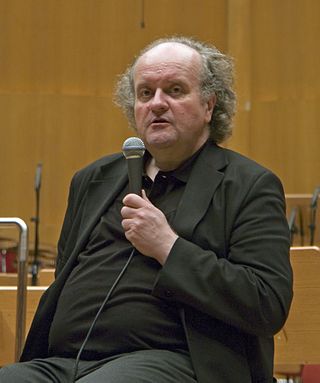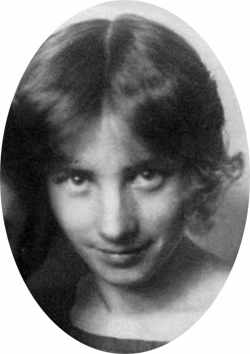Related Research Articles

Edward Benjamin Britten, Baron Britten was an English composer, conductor, and pianist. He was a central figure of 20th-century British music, with a range of works including opera, other vocal music, orchestral and chamber pieces. His best-known works include the opera Peter Grimes (1945), the War Requiem (1962) and the orchestral showpiece The Young Person's Guide to the Orchestra (1945).

Johann Christian Friedrich Hölderlin was a German poet and philosopher. Described by Norbert von Hellingrath as "the most German of Germans", Hölderlin was a key figure of German Romanticism. Particularly due to his early association with and philosophical influence on Georg Wilhelm Friedrich Hegel and Friedrich Wilhelm Joseph Schelling, he was also an important thinker in the development of German Idealism.

Frank Bridge was an English composer, violist and conductor.

Wolfgang Rihm is a German composer and academic teacher. He is musical director of the Institute of New Music and Media at the University of Music Karlsruhe and has been composer in residence at the Lucerne Festival and the Salzburg Festival. He was honoured as Officier of the Ordre des Arts et des Lettres in 2001. His musical work includes more than 500 works. In 2012, The Guardian wrote: "enormous output and bewildering variety of styles and sounds".
Winter Words, Op. 52, is a song cycle for tenor and piano by Benjamin Britten. Written in 1953, it sets eight poems by Thomas Hardy. The cycle is named after Hardy's last published collection, but the poems are from different parts of his collected poems.

Louis, Prince of Hesse and by Rhine was the youngest son of Ernest Louis, Grand Duke of Hesse by his second wife, Princess Eleonore of Solms-Hohensolms-Lich. He was a great-grandson of Queen Victoria.
Donald Charles Peter Mitchell CBE was a British writer on music, particularly known for his books on Gustav Mahler and Benjamin Britten and for the book The Language of Modern Music, published in 1963.
A Birthday Hansel, Op. 92, is a song cycle for 'high voice' and harp composed by Benjamin Britten and set to texts by Robert Burns. The last song cycle that Britten wrote, it was composed in honour of the Queen Mother's 75th birthday, at the request of her daughter, Elizabeth II.

Sophie Adele Wyss was a Swiss soprano who made her career as a concert singer and broadcaster in the UK. She was noted for her performances of French works, many of them new to Britain, for giving the world premieres of Benjamin Britten's orchestral song cycles Our Hunting Fathers (1936) and Les Illuminations (1940), and for encouraging other composers to set English and French texts. Among those who wrote for her were Lennox Berkeley, Arnold Cooke, Roberto Gerhard, Elizabeth Maconchy, Peter Racine Fricker, Alan Rawsthorne and Mátyás Seiber.
Seven Sonnets of Michelangelo is a song cycle composed by Benjamin Britten (1913–76) for tenor voice and piano in 1940, and published as his Op. 22. It was written for himself and his life-partner, the tenor Peter Pears (1910–86). The manuscripts of the songs are dated between April and October 1940; but there is some evidence that the cycle had been contemplated, and even begun, as early as 1937. It consists of settings of seven sonnets, all love songs, by the Italian painter and poet Michelangelo (1475–1564), in the original language:
- XVI: "Si come nella penna e nell'inchiostro"
- XXXI: "A che più debb'io mai l'intensa voglia"
- XXX: "Veggio co' bei vostri occhi un dolce lume"
- LV: "Tu sa, ch'io so, signor mie, che tu sai"
- XXXVIII: "Rendete agli occhi miei, o fonte o fiume"
- XXXII: "S'un casto amor, s'una pietà superna"
- XXIV: "Spirto ben nato, in cui si specchia e vede"
The Holy Sonnets of John Donne is a song cycle composed in 1945 by Benjamin Britten for tenor or soprano voice and piano, and published as his Op. 35. It was written for himself and his life-partner, the tenor Peter Pears, and its first performance was by them at the Wigmore Hall, London on 22 November 1945. Britten began to compose the cycle shortly after visiting, seeing the horrors of, and performing at, the liberated Nazi Bergen-Belsen concentration camp.
Songs and Proverbs of William Blake is a song cycle composed by Benjamin Britten (1913–76) in 1965 for baritone voice and piano and published as his Op. 74. The published score states that the words were "selected by Peter Pears" from Proverbs of Hell, Auguries of Innocence and Songs of Experience by William Blake (1757–1827). It was premiered at the Aldeburgh Festival in June 1965 by the German baritone Dietrich Fischer-Dieskau (1925–2012) and the composer. The critic William Mann thought that the cycle would be judged "Britten's deepest and most subtle song-cycle"; and John Warrack wrote in The Daily Telegraph that Britten "has, I feel, here come to terms with the darkness and sense of cruelty that has always stalked his art".
The Poet's Echo is a song cycle composed by Benjamin Britten (1913–76) in August 1965 during a holiday visit to the Soviet Union, in Dilizhan, Armenia. It consists of settings for high voice and piano of six poems by the Russian poet Alexandr Pushkin (1799–1837), in their original language. It was published as his Op. 76.
Who Are These Children? is a song cycle for tenor and piano composed in 1969 by Benjamin Britten (1913–76), and published as his Op. 84. It consists of settings of twelve poems by the Scottish poet William Soutar (1898–1943).
Songs from the Chinese is a song cycle for soprano or tenor and guitar composed in 1957 by Benjamin Britten (1913–76), and published as his Op. 58. It consists of settings of six poems translated from the original Chinese by Arthur Waley (1889–1966). It was written for, and first performed by, the tenor Peter Pears and the guitarist Julian Bream.

The Zorian Quartet was an English all-female string quartet ensemble. It was founded in 1942 by and named after violinist Olive Zorian. It gave the premiere performances of, and made the first recordings of, several compositions for string quartet by English composers, including Benjamin Britten and Michael Tippett. It also gave the premiere English performances of quartets by Ernest Bloch and Béla Bartók.
Noémie Pérugia was a French soprano.

Peter Burra was a British writer and critic, the author of "The Novels of E. M. Forster".

Canticle IV: The Journey of the Magi, Op. 86, is a composition for three male solo voices and piano by Benjamin Britten, part of his series of five Canticles. It sets the text of T. S. Eliot's poem "Journey of the Magi", retelling the story of the biblical Magi. The work was premiered in June 1971 at the Aldeburgh Festival by James Bowman, Peter Pears and John Shirley-Quirk, with Britten as the pianist. It was published the following year, dedicated to the three singers.
References
- ↑ Carpenter, Humphrey (1992). Benjamin Britten: A Biography. London: Faber and Faber. p. 388. ISBN 0-571-14324-5.
- ↑ Evans, Peter (1979). The Music of Benjamin Britten. London, Melbourne and Toronto: J. M. Dent & Sons. pp. 365–370. ISBN 0-460-04350-1.
- ↑ "Sechs Holderlin-Fragmente". Britten-Pears Foundation. Retrieved 25 April 2015.
- ↑ "Sechs Hölderlin-Fragmente: Song Cycle by (Edward) Benjamin Britten (1913–1976)". The LiederNet Archive. Retrieved 25 April 2015.